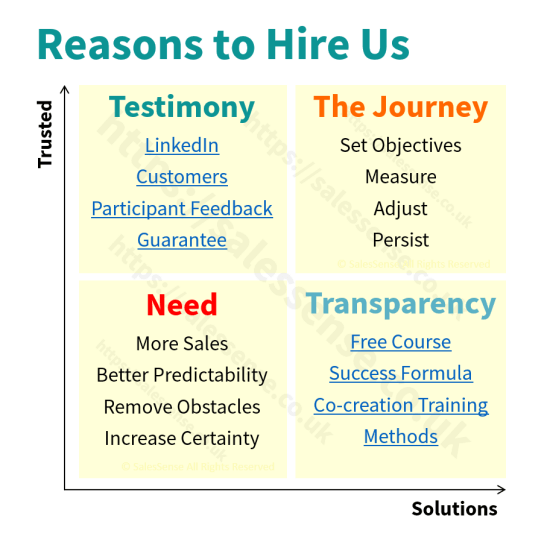SDR and BDR telephone sales training course.

Maintain or renew sales career momentum through our telephone sales training course.
What sets a telephone sales training course apart from others?
- Based on practical best practices research and professional experience.
- Participants are invited to study the material in advance. Training time is used to develop new practices. trying them out, and planning implementation.
- The creation of workplace actions for embedding learning in routines and habits.
- The opportunity for one-to-one learning.
- Delivery by the course author.
- Our performance guarantee.
Arrange a free session. Choose one of the 10 course sections listed below. Learn more.
Participants take on workplace assignments in one-to-one or group workshops and briefing sessions. Then they reconvene to review results, adjust their approach, and take on their next assignment. The programme can be spread over several months, condensed into longer more intensive sessions, or delivered over two consecutive days.
Key Takeaways
- Use social tools for qualification.
- Get introduced or referred.
- Create warm links from cold approaches.
- Have gatekeepers help you get through.
- Use voice mail to your advantage.
- Get through to decision-makers more often.
- Increase dial-to-sale conversion rates.
Course Sections:
- Introduction
- Learning management, objectives, and the plan.
- Find Prospects that Need What You Sell
- Make your ideal prospects easy to find and approach.
- Combine the Best Outreach Methods
- Create a high-impact contact plan
- First Contact Essentials
- What to say to stimulate interest get engagement
- Upgrade Communication Skills
- Steer thinking through questioning and listening
- Answer Spoken and Unspoken Questions
- Lead people to think what you want them to think
- Nonverbal Impact
- How to improve nonverbal observations and projections
- Passive Control
- Turning around objections and gaining commitment
- Self Management
- Maintaining energy, optimism, and motivation
- Review and Next Steps
- How to transform learning into results.
Typical Participant Comments
I really enjoyed this course. The cohesive progression through the call script was comprehensive and enlightening. From Data Capture
Interesting subject matter which was well presented by an excellent programme leader with great knowledge and enthusiasm From ACI
I learnt how to deal with situations that I would normally have given up on! From Montal
Just thought I'd drop you a line to say thanks for the last few days of training. I found it really helpful and am spending some time this afternoon preparing some strategies to help with the cold calling. Thought you'd like to know that, though it wasn't specifically a cold call, more a warm one, I turned around an 'I'm too busy' rejection and secured an appointment this morning! Who says training never works?! From Akibia
Telephone Sales Training Course includes:
- Pre-course questionnaire.
- Pre-work preparation guide.
- Personalised assignments.
- In-course materials.
- Online resources.
- Career-long support.
Materials and resources:
- Self-study recommendations.
- Accelerated learning guide.
- Course slide-decks.
- Product and service benefits worksheet.
- Top six customer questions response worksheet.
- Top six customer questions response guide.
- Customer service case study exercise.
- Recognising thinking style exercise.
- Hearing sensory language exercise.
- How to read people - report.
- Call planning template.
- Gatekeeper survey.
- Voice mail tactics guide and examples.
- Breaking decision maker preoccupation - examples.
- Fob off excuse turn around solutions worksheet.
- Fob off excuse turnaround solutions examples.
- Call tracking and benchmarking template.
Telephone Sales Training Course Delivery Options
Arrange a free session. Choose one of the 10 course sections listed above. Learn more.
Scheduled Course
Join a scheduled course to take part in 10 weekly virtual classroom sessions with a maximum of seven other participants.
£595 - Learn more. Multiple bookings discount offers. 🛒
One to One
Arrange one-to-one sessions to work through the material and apply learning through on-the-job actions. Sessions take place in a virtual classroom, last one hour and are scheduled to suit participant needs. View and download presentations, tools, templates, and session recordings.
£995 Learn more. Booking page. 🛒
One-to-one on a per-session basis.
£150 per session. Learn more. Booking page. 🛒
Group Training in a Virtual Classroom
£3995 delivered through four 2-hour 0r eight 1-hour virtual classroom sessions. Learn more. Booking page. 🛒
Group training on a per-session basis:
£450 per session. Learn more. Booking page. 🛒
Fees exclude applicable VAT.
Traditional Classroom
Delivery over one or more days at a conference venue or the customer's offices. Contact us for fees.
Train the Trainer
Includes a licence to deliver the course with SalesSense materials for up to 100 participants.
£2495 Learn more. Booking page. 🛒
What are the important telephone sales best practices?
B2B sales prospecting by phone can be highly effective if done right. A telephone sales training course should help you adopt the right habits. Incorporating certain best practices can help you improve your chances of success. Here are some key strategies for successful phone-based prospecting:
1. Research Thoroughly
Know the company: Before making the call, research the prospect’s business, industry, and pain points. This demonstrates professionalism and helps you tailor your pitch.
Understand decision-makers: Identify the right people to talk to. Typically, the decision-makers in UK companies include directors, C-level executives, or department heads.
2. Use a Warm Approach
Start with value: British professionals appreciate a direct but polite approach. Rather than focusing on your product, highlight how you can help their business right from the start.
Personalise the conversation: Mention specific details about the company or person, which shows you've taken time to understand their situation.
3. Follow Proper Etiquette
Respect business hours: Call during appropriate working hours, usually between 9 AM and 5 PM, avoiding early mornings and late afternoons.
Be polite and concise: UK business culture values professionalism and efficiency, so be respectful and avoid overtalking.
Ask for permission to continue: After introducing yourself, ask if it’s a convenient time to talk. If they’re busy, suggest a time to follow up.
4. Build Rapport Quickly
Tone of voice: Keep your tone professional yet warm. Avoid sounding overly salesy or rehearsed.
Open with a strong hook: State why you're calling early on, referencing something specific to their company that would make them want to continue the conversation.
Show empathy: Listen to their responses and acknowledge their business needs or challenges.
5. Qualify the Lead
Ask open-ended questions: Use discovery questions to identify their current challenges, needs, and the status of their decision-making process.
Qualify early: Determine whether the company is a good fit early in the conversation to avoid wasting time on unsuitable leads.
6. Overcome Objections Gracefully
Pre-empt objections: Anticipate potential objections they may raise, such as budget concerns or timing, and be prepared with answers.
Acknowledge their concerns: Don’t dismiss their objections. Instead, acknowledge them and provide thoughtful, relevant solutions.
7. Focus on Value, Not Features
Sell solutions, not products: Focus on the value your product or service can bring to their business. Avoid getting too technical unless the prospect asks for details.
Align with their goals: Show how your solution directly aligns with their business objectives or can solve a specific problem they’re facing.
8. Set a Clear Next Step
End with a CTA: Before concluding the call, clearly outline the next steps, whether it's setting up a meeting, sending additional information, or arranging a demo.
Schedule follow-ups: Confirm a specific time for the next call or meeting, and follow through on that commitment.
9. Keep Detailed Notes
Track interactions: Use a CRM to keep records of each call, including key details discussed, pain points, and next steps. This ensures you have a reference for future conversations and can personalise follow-ups.
10. Follow Up Professionally
Send an email after the call: Thank the prospect for their time and summarise the key points and next steps. This helps reinforce the conversation and keeps the momentum going.
Follow-up consistently: If the prospect doesn’t respond immediately, be persistent but not pushy. Leave a few days between follow-ups and refer back to your previous conversation.
By combining these best practices, you can make a strong impression during B2B sales prospecting calls and increase your chances of converting prospects into qualified leads.
Guarantee
We unconditionally guarantee the quality and effectiveness of our services. In addition, we warrant that applying the principles, methods, and practices presented in our materials will lead to a gain in value equivalent to at least five times the fees. Should you decide that our services have not met this guarantee, we will refund your fees promptly and courteously.
Want Something Different? Please Ask:
If you are looking for a telephone sales training course or telemarketing training that combines telephone sales techniques with new social selling methods, book this course. Telephone +44 (0)1392 851500. Alternatively, use the contact form here or send an email to custserv@salessense.co.uk.






















